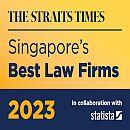Family and Matrimonial Partner Carrie Gill quoted in the New Straits Times article titled "Some divorced Singapore parents using lockdown to deny former spouses access to children"
Eversheds Harry Elias Family and Matrimonial Partner Carrie Gill has been quoted in the New Straits Times article titled "Some divorced Singapore parents using lockdown to deny former spouses access to children". The article was first published on 13 April 2020.
Some divorced Singapore parents using lockdown to deny former spouses access to children
SINGAPORE: Jane (not her real name) was supposed to meet her son once a week as part of court-ordered custodial arrangements following her divorce with her ex-husband five years ago.
But when Singapore started its circuit breaker on April 7, her ex-husband denied her access to their child.
The one-month-long circuit breaker saw schools and non-essential workplaces closed, with individuals told to stay at home as much as possible, in a bid to curb the Covid-19 outbreak.
New laws recently passed to restrict movements, as part of the Covid-19 (Temporary Measures) Act, took effect a day later.
The Ministry of Health (MOH) released guidelines on April 9 stating that children of divorced parents are allowed to take turns to live with either parent, although any movement and travel should be kept to a minimum.
Access arrangements can also continue, other than visits that have to be supervised.
These guidelines have also been written into the Act.
Below is an excerpt from the article which features comment from Carrie:
Family lawyers TODAY spoke to earlier said they have received a higher number of queries from their divorced clients who were unsure as to whether prior custodial arrangements could still continue during the circuit breaker period.
Before MOH guidelines were released, different lawyers had their own interpretations of what the new restrictions entailed.
Some believe that access arrangements could go on as per normal, while others said otherwise.
Carrie Gill, partner at law firm Eversheds Harry Elias, had advised her clients to act sensibly when discussing and making decisions regarding access arrangements.
“Parents should be open and communicative with each other of their concerns and worries. The health, wellbeing and safety of the children must be the most important consideration,” she said.
Full article can be found here.
Source: New Straits Times
Author: Today Online
For more information, please contact our Business Development Manager, Ricky Soetikno at rickysoetikno@eversheds-harryelias.com













